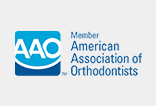Do You Know at What Age Your Child Should Begin to See an Orthodontist?
 The American Association of Orthodontists (AAO) recommends that a child should have their first evaluation by an Orthodontic Specialist by the age of 7, or even earlier if you or your child’s dentist perceives that there might be a problem. Early intervention, when necessary, is the best prevention!
The American Association of Orthodontists (AAO) recommends that a child should have their first evaluation by an Orthodontic Specialist by the age of 7, or even earlier if you or your child’s dentist perceives that there might be a problem. Early intervention, when necessary, is the best prevention!
Do you know what problems to look for in your child’s mouth? To find out more on this topic, check out our website at turkeorthodontics.com/faq-for-children
 By the age of 7, your child’s first molars and incisors have begun to erupt, and it is at this time that your orthodontic specialist can evaluate your child’s bite. All children are beautiful in their parents’ eyes, and sometimes those very things that we find so adorable about our children – such as their cute toothless grin, their precious little lisp, or even that special way they pronounce their “l’s” and “r’s” – can be temporary issues, but they can also be an indication of a more serious problem that could follow your child into adulthood.
By the age of 7, your child’s first molars and incisors have begun to erupt, and it is at this time that your orthodontic specialist can evaluate your child’s bite. All children are beautiful in their parents’ eyes, and sometimes those very things that we find so adorable about our children – such as their cute toothless grin, their precious little lisp, or even that special way they pronounce their “l’s” and “r’s” – can be temporary issues, but they can also be an indication of a more serious problem that could follow your child into adulthood.
Early evaluation will give your orthodontist the chance to detect any potential problems your child may have, as well as allow a greater opportunity for earlier, more effective treatment. Your orthodontic specialist will be able to guide the growth and development of your child’s bite and prevent more serious problems later. When early orthodontic intervention is not necessary, an orthodontist can carefully monitor growth and development and begin treatment when it is ideal.
Phase I Treatment
Phase I treatment, also known as early intervention or interceptive orthodontic treatment, typically starts with children who have a mixture of baby teeth and permanent teeth – normally between the ages of 6 and 10. Early treatment can correct severe crowding, tooth eruption problems, bite problems, narrow jaws, and protruding front teeth, just to name a few. It may prevent the future need for the extractions of permanent teeth; reduce the likelihood of impacted permanent teeth; eliminate speech difficulties, abnormal swallowing, and mouth breathing; correct improper oral habits; and perhaps eliminate the need for future surgical procedures. Braces may still be required after all of the permanent teeth have come in; however, early intervention usually shortens the treatment time.




